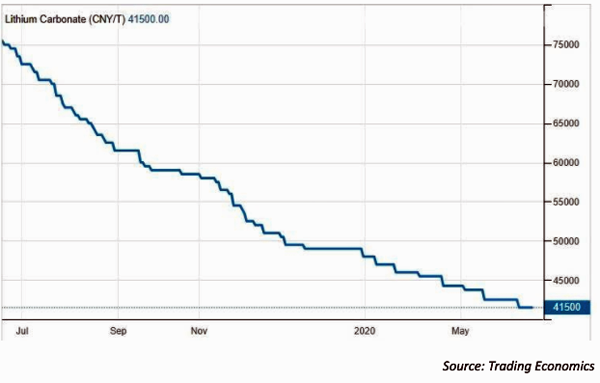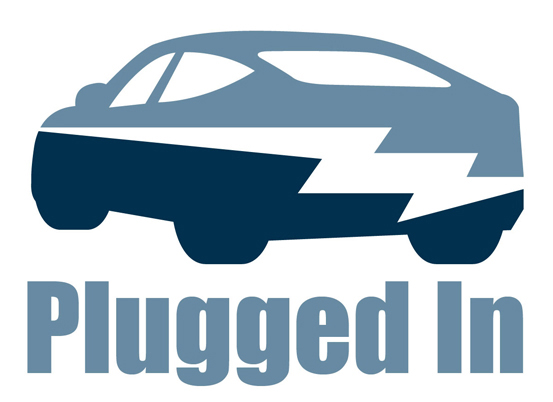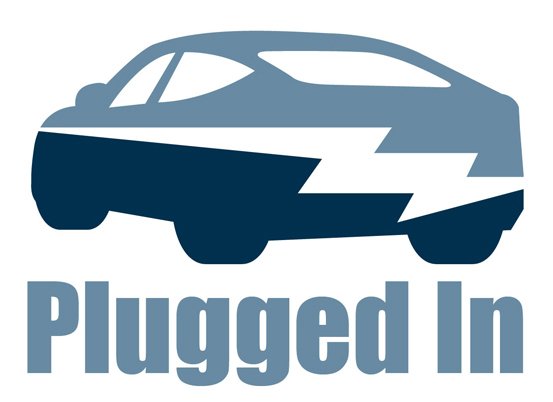New Chemistries, Cheaper Metals Spark EV Battery Price Declines
 Thursday, June 18, 2020 at 2:44PM
Thursday, June 18, 2020 at 2:44PM  Grant Gerke
Grant Gerke This is a guest post from John Gartner, Vehicle Electrification and Mobility Consultant and Researcher. Originally posted on June 18, 2020.
 Cost of Lithium Carbonate in China, Last 12 Months.
Cost of Lithium Carbonate in China, Last 12 Months.
If electric vehicles are to become mainstream, they need to become comparable to internal combustion engine vehicles in their purchase price. Reducing the cost of the EV battery packs – a major contributor to the overall price tag – is essential to reaching price parity. Battery costs are expected to continue their downhill slide due to declining material costs as well as manufacturers eliminating the use of premium-priced metals.
According to Bloomberg New Energy Finance (BNEF), an EV's battery pack comprised 40.9% of the vehicle's cost in 2017 a figure that will drop to less than 20% by 2025. Battery prices have fallen from more than $1,000 per kilowatt hour (kWh) in 2010 to $156 in 2019. Despite the surge in demand for battery materials, the price of lithium, cobalt and other metals used in lithium ion batteries have and will continue to fall, according to Alex Eller, a senior research analyst at Guidehouse Insights. Eller, who authored the recent report "Market Data: Energy Storage Pricing Trends," said the price of lithium-ion battery packs used in EVs and stationary energy storage "will continue to decline by approximately 6.5% annually during the next decade."
The EV market will continue to represent 93% of sales of large format lithium ion batteries, which are also used in stationary storage, according to Eller. Manufacturing of batteries in much larger quantities will provide efficiencies that will contribute to the cost reductions. According to Eller, the global manufacturing capacity of large format lithium ion cells could double in the next three years.
Battery makers are seeing the cost of metals go down while also reducing the quantity of higher cost metals. According to Trading Economics, the cost of lithium in China fell 20.2% during the past 12 months ending in May 2020, and will drop another 6.5% during the next year. Cobalt, another costly component of many EV batteries, has dropped by 11.4% so far in 2020, and will fall another 14.1% during the next year, according to Trading Economics.
Chinese battery manufacturer SVOLT recently announced two EV batteries that do not require cobalt. The company claims that the batteries have a longer cycle life and higher energy density than competing products. Also in China, Contemporary Amperex Technology Limited (CATL) announced an EV battery that does not include cobalt and claims a life expectancy in a vehicle for more than a million miles of driving. CATL provides batteries to Tesla for the domestic market.
These and other improvements in battery cost and performance should make EVs more attractive to potential car buyers in the coming years as price parity with ICEs nears. The average transaction price of a new light duty vehicle in the U.S. was $38,948 in December 2019, according to Kelley Blue Book. By comparison, the 2020 Nissan Leaf has a base price of $31,600 (before taxes and destination fees), while the Tesla Model 3 is listed at $37,990.


Reader Comments